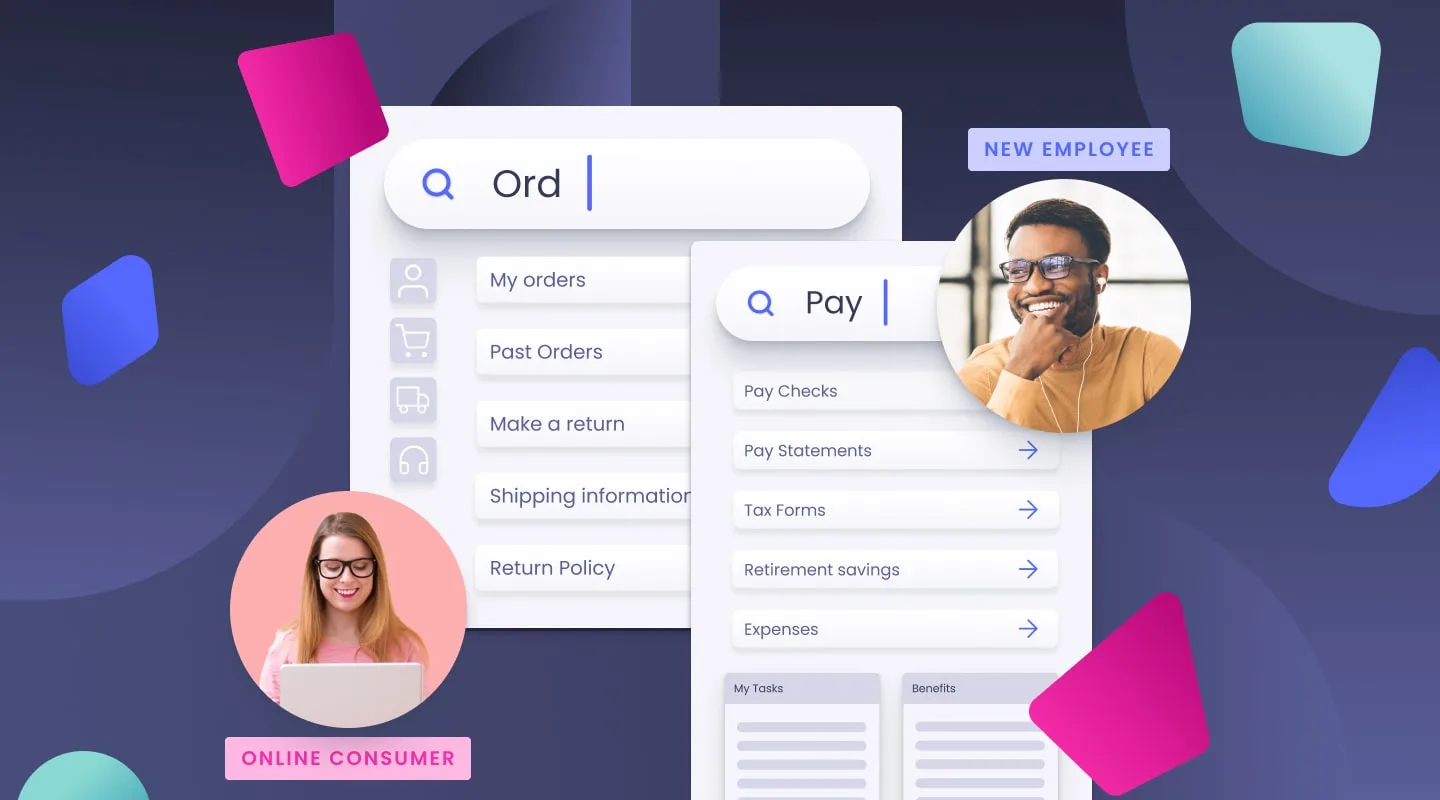Enterprise search helps employees quickly locate the information they need across various systems, databases, and repositories within an organization. In a world where data volume and complexity continue to grow, enterprise search brings order to chaos, boosting productivity and driving better decision-making.
Modern enterprise search, particularly AI-powered platforms, deliver more than just keyword matches. They understand user intent, personalize results, and integrate information across siloed systems. This article explores what enterprise search is, why it matters, how AI is transforming it, and what you should know to implement it effectively.
What is enterprise search?
Enterprise search is a unified system designed to help employees find relevant information across an organization’s many data repositories. Whether it’s a customer support agent solving an issue or a manager analyzing performance data, enterprise search eliminates the need to jump between platforms.
From a user’s perspective, it’s simple: type a query (or upload an image), and relevant results appear. But behind the scenes, this requires powerful technology—especially when the system must search millions of documents with varying formats and permissions.
The AI advantage: AI-driven enterprise search
AI is revolutionizing enterprise search through techniques like large language models (LLMs), vector search, and generative AI. Traditional keyword search alone is no longer sufficient in environments filled with unstructured, ambiguous, or siloed data. Here’s how AI changes the game:
Smarter query interpretation
AI interprets queries that are ambiguous or contain errors. It understands intent based on context, user role, and past behavior. For example, the term "scaling" may mean different things to a DevOps engineer versus a sales manager—AI can determine context and personalize results accordingly.
AI-powered ranking
AI algorithms rank search results based on user context, behavior, and popularity among peers with similar roles, increasing the relevance and usefulness of surfaced information.
Personalization
Search experiences can be personalized based on user role, department, past queries, and access rights. This not only improves efficiency but ensures that users see only the content they are authorized to access.
The strategic benefits of AI-driven enterprise search
An AI-powered search solution drives tangible benefits:
-
Increased productivity: Less time searching, more time executing.
-
Faster decision-making: Access to the right data when it matters.
-
Improved customer service: Reps can find answers beyond basic FAQs.
One IDC study found that knowledge workers spend 30% of their time looking for information, and a shocking 32% had made a wrong decision because they lacked awareness of relevant data. Enterprise search helps reverse this inefficiency.
Implementation essentials: from indexing to integration
Getting started with enterprise search begins with indexing and connecting your data.
Data indexing
Data lives in many places: CRMs, ERPs, wikis, file systems, data lakes, and more. Indexing unifies this data so it can be queried. The key steps are:
-
Connection: APIs connect your search engine to various platforms (e.g., Salesforce, Zendesk, Notion).
-
Transformation: Raw data must be cleaned, labeled, and structured. Poorly formatted data leads to irrelevant results.
For example, at Algolia, we’ve released a built-in Data Transformation feature that enables organizations to easily transform, clean, and manipulate data during ingestion.
API-first design
Today’s best search platforms follow an API-first approach. This allows easy integration with back-end systems, supports data federation, and reduces implementation complexity.
Overcoming common challenges with AI-powered enterprise search
Implementing enterprise search is not without challenges. Enterprise search isn’t plug-and-play. Some of the most common hurdles include:
1. Data silos
Organizations typically store data in fragmented, incompatible systems. Search platforms must unify these while preserving data integrity. Data is often stored in different formats and schema, making indexing challenging.
2. Permissions
Each data source may have its own access rules. Maintaining access control across all systems is complex but critical for compliance.
3. Relevance
Users expect good results. Optimizing search quality requires clean metadata, semantic understanding, and continuous algorithm updates based on analytics.
Measuring success: enterprise search KPIs
Success should be measured with clear, role-specific metrics including:
Why does this matter? Because analytics are the feedback loop that turns enterprise search from a static tool into a dynamic, continually improving experience. By tracking how users interact with search—what they click on, how often they refine queries, how long it takes to find what they need—organizations gain insight into what's working and what isn't.
For knowledge workers, this can mean the difference between a frustrating search experience and one that feels intuitive and productive. Analytics reveal where gaps in search relevance exist, where metadata might be lacking, and how content can be better structured or surfaced. This data-driven approach enables ongoing optimization of the search algorithms, leading to faster access to information, fewer support escalations, and smarter business decisions overall.
Customer support metrics
Internal workforce metrics
-
Total searches (adoption)
-
First-attempt success rate
-
Time to retrieve information
-
Query refinement rate
-
User satisfaction score
In addition, general search analytics such as bounces, clicks, and no-results, offer a measure of quality.
Future trends in enterprise search and AI
The future of enterprise search lies in deeper AI integration—and it's looking smarter, faster, and more personalized than ever before. As enterprise environments become more complex, users expect more from their search tools. It's no longer just about finding documents; it's about guiding users to the exact piece of insight they need, when they need it, no matter where it lives.
What’s on the horizon? Think hyper-personalized search experiences that evolve in real time based on behavior. Imagine being able to search not just with text, but also with images, voice, or even incomplete thoughts, and still get spot-on results. And with generative AI assistants joining the mix, search won’t just return documents—it’ll synthesize information, explain it conversationally, and help users make sense of it all. In short, enterprise search is transforming into a proactive digital partner.
-
Hyper-personalization: Real-time behavior data will drive even more tailored results.
-
Multimodal search: Image and voice queries will gain traction.
-
Generative AI assistants: Tools like ChatGPT will merge with search to deliver conversational, synthesized results alongside traditional listings.
Why choose Algolia for enterprise search?
Algolia delivers a powerful enterprise-scale search engine built for today’s workplace. It’s designed to get employees the answers they need in milliseconds, so they can stop wasting time digging through folders or waiting on colleagues to point them in the right direction. Instead of losing time to frustrating searches, teams can focus on analyzing, acting, and making meaningful decisions.
With Algolia, access to information becomes frictionless. Whether your data lives in dozens of platforms or is spread across structured and unstructured formats, Algolia connects the dots so users can search once and find everything. That’s a game changer for productivity and decision-making alike.
And from a technical standpoint, it’s built for real-world implementation. The API-first architecture means IT teams can hook it into virtually any system with minimal friction. Developers can create custom search interfaces using open-source front-end libraries. And with built-in data transformation, organizations can clean and prepare their data for search right in the platform—no need for complex ETL pipelines or custom tooling.
Conclusion: taking the next step
Enterprise search has moved far beyond simple keyword matching. With AI, companies can deliver fast, relevant, secure, and personalized search experiences that truly empower employees.
If your team is struggling to find information across platforms, it may be time to explore what Algolia’s AI-powered enterprise search can do for you. Request a demo to speak to a sales expert today, or signup to try Algolia for yourself.
AI Search
The results users need to seeAI Browse
Category and collection pages built by AIAI Recommendations
Suggestions anywhere in the user journeyAdvanced Personalization
Tailored experiences drive profitabilityMerchandising Studio
Data-enhanced customer experiences, without codeAnalytics
All your insights in one dashboardUI Components
Pre-built components for custom journeys




